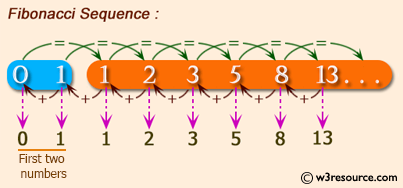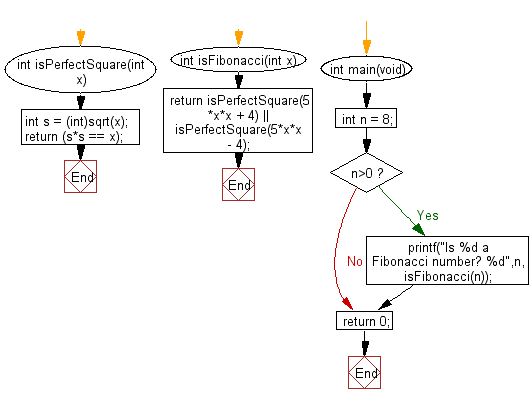C Exercises: Check if a given number is Fibonacci number or not
C Programming Mathematics: Exercise-26 with Solution
Write a C program to check if a given number is Fibonacci number or not.
In mathematics, the Fibonacci numbers, commonly denoted Fn form a sequence, called the Fibonacci sequence, such that each number is the sum of the two preceding ones, starting from 0 and 1. That is, and for n > 1. By starting with 1 and 2, the first 10 terms will be: 1, 2, 3, 5, 8, 13, 21, 34, 55, 89.
Example:
Input: n = 8
Output: Is 8 a Fibonacci number? 1
Pictorial Presentation:

Sample Solution:
C Code:
#include <stdio.h>
#include <math.h>
int isPerfectSquare(int x)
{
int s = (int)sqrt(x);
return (s*s == x);
}
int isFibonacci(int x)
{
return isPerfectSquare(5*x*x + 4) ||
isPerfectSquare(5*x*x - 4);
}
int main(void)
{
//int n = 12;
//int n = 55;
int n = 8;
if (n>0)
{
printf("Is %d a Fibonacci number? %d",n, isFibonacci(n));
}
return 0;
}
Sample Output:
Is 8 a Fibonacci number? 1
Flowchart:

C Programming Code Editor:
Improve this sample solution and post your code through Disqus.
Previous: Write a C program to print all prime factors of a given number.
Next: Write a C program to multiply two numbers using bitwise operators.
What is the difficulty level of this exercise?
Test your Programming skills with w3resource's quiz.
C Programming: Tips of the Day
Static variable inside of a function in C
The scope of variable is where the variable name can be seen. Here, x is visible only inside function foo().
The lifetime of a variable is the period over which it exists. If x were defined without the keyword static, the lifetime would be from the entry into foo() to the return from foo(); so it would be re-initialized to 5 on every call.
The keyword static acts to extend the lifetime of a variable to the lifetime of the programme; e.g. initialization occurs once and once only and then the variable retains its value - whatever it has come to be - over all future calls to foo().
Ref : https://bit.ly/3fOq7XP
- New Content published on w3resource:
- HTML-CSS Practical: Exercises, Practice, Solution
- Java Regular Expression: Exercises, Practice, Solution
- Scala Programming Exercises, Practice, Solution
- Python Itertools exercises
- Python Numpy exercises
- Python GeoPy Package exercises
- Python Pandas exercises
- Python nltk exercises
- Python BeautifulSoup exercises
- Form Template
- Composer - PHP Package Manager
- PHPUnit - PHP Testing
- Laravel - PHP Framework
- Angular - JavaScript Framework
- Vue - JavaScript Framework
- Jest - JavaScript Testing Framework
